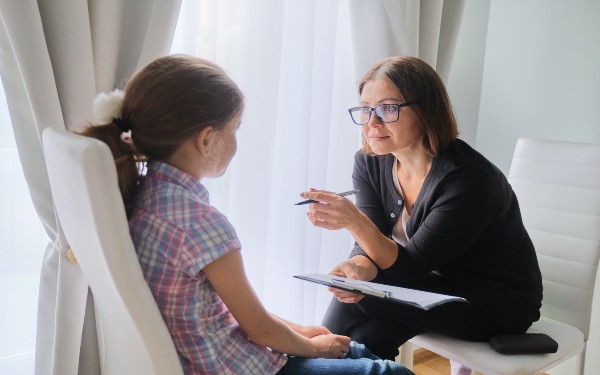
Remote working, a makeshift solution during the pandemic, has evolved into a preferred working model for many practitioners.
The latest survey on the pandemic’s impact on health and social care staff, carried out from November 2022 to January 2023, found that 8.6% of social workers were working entirely from home, with a further 70.9% doing so some of the time.
But in two reports last year, Ofsted raised three significant concerns about the impact of remote working on practice.
Ofsted’s remote working concerns

Ofsted chief inspector Amanda Spielman
Remote practice risked robbing social workers of the peer support needed for “good social work practice to thrive”, which was built by face-to-face contact, the inspectorate said in a report last summer on the sector’s recovery from Covid.
Ofsted added that remote working had enabled practitioners living in rural areas to take up posts with higher salaries in London boroughs. This could “erode the quality of social work” due to these practitioners lacking knowledge and understanding of the communities they served, it warned.
Its annual report, published in December 2022, also cautioned that, though face-to-face visits had returned to pre-pandemic levels, social workers may be spending less time with children due to remote working, undermining relationships with them.
Echoing this, the Association of Directors of Children’s Services (ADCS) suggested last month that some frontline agency staff working remotely were not doing sufficient face-to-face work.
In its response to the Department for Education’s consultation on setting national rules on agency work, it urged the DfE to affirm that case-holding locums should always deliver face-to-face work with children and families.
What do social workers think?
To capture practitioners’ perspectives, we conducted a poll on whether social workers should be able to work fully remotely. The responses were mixed.
Over a third of the 676 respondents (36%) said this would never be appropriate, as social work was built on relationships – with your team and the people you support. A comparable proportion (34%) thought that remote work was not suitable for frontline staff, but could work for other roles.
However, the remainder (28%) said that all practitioners could work fully remotely.
This split in opinion is also evident in the comments readers have posted on relevant articles.
Working from home positives

Photo by Pexels
Beth wrote that she felt “more productive” at home due to the lack of distractions, such as “people coming in and out of the office”.
“I don’t feel isolated with the improvements in technology and am more connected than ever. I totally get that this way of working does not suit everyone, but it works for me,” she added.
EC said remote working enabled practitioners to take back “some control of their lives”, while Tom Hughes pointed to the time it saved.
“Just yesterday I had two children looked-after reviews held in person. In the pure remote era that was three hours,” he said. “Now, adding in the commute to the location and back that’s eight hours in total! One whole working day is worth two meetings.”
Claire, meanwhile, rejected the idea that social workers needed local knowledge, calling it “nonsense”.
“Anybody who works in a large city or rural area is very likely to live a long way from the office to be able to afford accommodation and for personal safety reasons,” she said. “Also, we live in a modern world and flexible working is with us to stay.”
Negative impacts of remote practice

Image by elenabsl/AdobeStock
However, echoing Ofsted, Lindsey pointed to the loss of peer support from remote working, sharing her experience of comforting a distressed colleague in the office with a cup of tea and some company.
“What we do is called social work for a reason,” she added.
“Talking, sharing, laughing, crying, risk managing and the occasional gossip about the head of service may not make me a better person, let alone a better social worker, but it certainly keeps the creeping alienation slightly at bay.”
Another reader, Mark, warned that remote working with families undermined quality of practice.
“I struggle to understand how anyone that works with vulnerable people honestly believes that remote working is in their best interests,” he said.
“So much of what we do in social work is observational – what is the situation like, surroundings, family dynamics, interactions between clients and their significant others and so on. This is lost when you’re talking to someone via Teams or the telephone.”
Remote working and face-to-face visits

Photo by Valerii Honcharuk/Adobe Stock
Several readers questioned the idea that remote working post pandemic had reduced face-to-face visiting, which is in line with Ofsted’s position in its annual report.
“Many of us work remotely on certain days but that doesn’t mean that we don’t visit or meet with the people we are supporting,” Angela pointed out “You can work from home and still go out on visits.” .
Lily said working from home did not affect her work with vulnerable children “as the home visits are mandatory”, while Chris B added: “I think this is very presumptuous in that remote working means less face-to-face contact.
“I do all my visits and meetings in person, but I mostly complete my records and reports at home. If I need to be at the office for a child, family or otherwise, I am there.”
Agency staff ‘being vilified’
The ADCS’s concerns about agency staff working remotely prompted some to accuse the association of attacking locum staff.
“Here they go again, creating a false narrative about agency social workers,” wrote Elaine in the related article.
“They haven’t provided any statistical data to support these claims. From my observation, local authorities require agency social workers to do face-to-face work like permanent staff. If there are agency social workers who only want to do remote working, then they don’t employ them.”
“Once again agency staff are being vilified and seen as second-class social workers, Yet local authorities would appoint them permanently in a heartbeat,” added Katie.
What are your thoughts on fully remote working? Tell us in the comments below!




 Family help: one local authority’s experience of the model
Family help: one local authority’s experience of the model  ‘I spent the first three months listening’: how supportive leadership can transform children’s services
‘I spent the first three months listening’: how supportive leadership can transform children’s services  How senior leaders in one authority maintain a culture of excellence
How senior leaders in one authority maintain a culture of excellence  How staff support ensures fantastic outcomes for children and families
How staff support ensures fantastic outcomes for children and families  Workforce Insights – showcasing a selection of the sector’s top recruiters
Workforce Insights – showcasing a selection of the sector’s top recruiters 

 Facebook
Facebook X
X LinkedIn
LinkedIn Instagram
Instagram
No. The clue is in job title “social”. You need see children and families face-to-face. Also, office is a place of peer support and sharing experiences. As a manager, i get a sense of how a worker is coping by noting how they are. Of course, covid has shown, can be more fluid working, doing reports and recording at home.
I am still studying to become a social worker, and can perceive that, fully remote working is not appropriate due to how intense this profession is, with the aim of supporting vulnerable people. Furthermore, as long as visiting children and families are not compromised it might be okay to work remotely, and obviously meeting with working colleagues might be vital to all members in the team, with regards to supporting each other physically.
Thank you.
Being a foster carer for the past 3.5 years, remote working by our social worker (9 social workers in 3 years) has led to disruption and lack of support for the carers. My foster child does not get to know his social worker and this has led to distrust.
Remote working for me is not having to be in the office to not get any work done and have pointless conversations about what other members of staff are doing. Most offices these days are open plan, noisy and. Unproductive to writing reports and assessments. Since covid I have worked for two local authorities one of which was as a child protection social worker and another in fostering . I went through lockdown working at home but still visiting all of my children in person. I also did joint visits with newly qualified social workers and many of the other team members sought my advice and support via teams or a phone call. I get that some people like to go into the office and that’s fine but I prefer to do my admin at home . It’s worth saying also that I’ve been an agency worker for 14 years and I have worked for long periods of time in areas that are not where or close to where I live. It’s utter nonsense that social workers need to live in the areas/towns they work to do their jobs more effectively. When you work anywhere long enough you get to know the culture and resources available. Build back worse should be the motto as to me it’s just an excuse to get bums back on seats / create more stress by daily commutes and be micro managed . Thanks but no thanks – seems to me that agency workers are getting blamed for what is a general deterioration of the job, underpaid and undervalued . Paying agency workers less will not fill the vacant roles no more than taking ir35 away led to them being filled.
Here here
Office working allows corporate control of social workers and their practice.
Spot on. We work differently as people. I’m Neuro-diverse as a Locum, I enjoy tranquil space.
I can always pop into the office whenever it suits me for to complete a piece of work, trainings and meeting and I do my face to face visits always.
I can appreciate everyone’s point of view on this, however, l feel that for me remote working is ideal. I don’t think it’s suitable for all social workers especially those just starting out on their career. Peer support is valuable in the early years. I feel that extremely stuffy , noisy, overcrowded office space is absolutely awful to work in, in terms of productivity and when supporting distressed people over the phone. Home visits and plenty of them are important, as is connecting online through the day. Home working all the way for me.
If every is home working there won’t be any peers in the office to support the newly qualified ??!!
Home working loses peer interaction and picking up additional information including potential connections between cases.
The home working argument appears to be about what suits the worker rather than what is best for the job. The suggestions that some areas of social work are better suited to home working concerns me, as does this who argue that fostering:elderly/disabled are less demanding or easier options – only the case if your mindset is to ignore what is going on/ I.e. the unhappy foster child, the elderly person who is always ‘falling over’, the disabled child who can’t tell you that something is wrong.
Social Workers should be there for the job not the other way round.
You should read what has been said / doing joint visits with peers and newly qualified provides plenty of opportunity to learn from more experienced workers – the elderly person or unhappy foster child should still get to see their social worker – the job is not office based or it shouldn’t be – being in an open noisy office does not make for better social workers – it makes for less productive ones – a good social worker would never ignore what is going on. The whole profession whatever the remit of the work or the type of client is not underpinned by what goes on in the office. Conversations and learning takes place in a variety of ways with colleagues – doesn’t have to always be sat at a desk
I couldn’t agree more.
And it is not only newly qualifieds who need colleagues around them to learn from. Practising social work safely and well involves learning throughout our career – all the informal learning from discussions with colleagues, picking up information and ideas from eachother in all manner of ways around an office, being able quickly to check out something with a colleague, none of this happens if everyone works from home. Over time if everyone does work from home eventually no one will have any close professional colleagues they have got to know well and have built up trust with to work with, share ideas with and get mutual support from. The concept and reality of a team, of any belonging, will disappear completely and instead practitioners will become isolated and atomised to the detriment of their work and own well being.
Local authorities have sold offices they do not provide suitable working conditions. The office I started my career in bears no resemblance to the office of 2023
Remote working … even for managers, damages the mental health of frontline workers. I’ve seen my manager 3 times (in person) in over 7 months – she quotes the benefits of “agile working” and that being in the office for her role, isn’t necessary. This is how clueless, some senior managers are nowadays.
I could not agree more Lou. What an atrocious response.
Senior managers should always lead by example not hide away. As a deputy director in 2020, I offered my services out to the teams to do the odd home visit if they were struggling or needed a pairing for safety … knew full well they would hand select the visits for other reasons (I would have done!)
Trust me, I’m not kind … as a senior manager I absolutely rely on credibility with, and loyalty from, frontline staff to do my job – for the sake of the odd home visit where wearing a mask was the least of your PPE concerns, it was a very good investment!
I think when we as Social Workers talk about remote working or working from home it is the paperwork, phone calls, admin work that we are talking about. Working face to face with children, carers, family etc is happening and is vital. It’s the not having to sit in a noisy office where I get very little work done and1.5 hours travelling from my home that to me is not productive. I get peer support when I need it, I call, have a Teams call or meet up with a colleague if necessary.
There is now a breed of social workers who are about self and not team. Lone practice is dangerous practice.
Yes there are remote ways to connect however there is a need for Local Authorities to provide good quality office space with quiet rooms.
I think there needs to be a balance. Caseloads play a part as overload makes the worker retreat to home to be quiet and gets things done. However social work is about human interaction and the team relationships need to be developed to support each other. Open plan office hell should have no place in social work.
Many years ago I worked in a scruffy office. It was however full of laughter, support and space to melt down. It was priceless.
Now I work in a remote team who are so unconnected I can log off at the end of a day and have had no contact with the team.
It’s wrong, shocking and needs adddressing.
Working from home is mainly to complete paper work. Most, if not all of our work as social workers require face to face contact, how else do we get our assessments right if we have no contact with the people we serve. however, a lot of our meeting do not need us to be sitting in a crowded room with our colleagues, when we have other medias where we can see each other face to face.
We have a 2 hour face to face team meeting, which take up 5 hours of my time. however when the meeting is held on teams I have 3 hours to enable me to write a report or do my recordings. The only down side is that some managers use this as an opportunity to increase your work load.
“Just yesterday I had two children looked-after reviews held in person. In the pure remote era that was three hours,” he said. “Now, adding in the commute to the location and back that’s eight hours in total! One whole working day is worth two meetings.”
Is it just me or is the fact that this is seen as a positive argument for working from home, terrifying? I wonder who else could have been present for those remote era reviews, just out of camera sight, but absolutely controlling what was being said. I used to get far more info out the children concerned if as part of the review I took them for a drive or to the park for half an hour.
I senior managed a regions community mental health services through the pandemic. Came in every day and largely based myself on one or other of the team bases. My husband who worked in children and families also went in every day. Having that visible profile was more important than ever (in my opinion) during the pandemic.
The health staff were told by NHS they had to come in, the social workers were told by the local authority they could all work from home and not undertake any visits. Although I am a SW I’m employed by NHS so appealed to their better nature saying you can’t ask your health colleagues to visit for you, and we’re either a team or we’re not.
Delighted and proud to say with only one exception, they all came in.
I’ve been often embarrassed by the social work response during the pandemic – capacity assessments done remotely (and that enables and maximises how exactly?), home visits by zoom without any concept of coercion by the presence of a 3rd party, (or the value of being able to see and smell! Clare in the Community pointed out the pitfalls and failures in that beautifully in relation to hoarding), even MHA assessments as an AMPH being proposed remotely (and undertaken so in at least one county I believe until stopped).
Even now I’m getting applications from 100+ miles away for jobs from people with zero intention of actually coming in.
Open Plan, hot desking offices killed the peer support in social work not remote working.
Our office is busy and noisy and full of distractions and I get no work done in there. Additionally, we sit with colleagues from other council departments and I don’t feel social work conversations are always appropriate in the setting.
Of course, visits need to be face to face but paperwork (which is sadly 70% of the job) can just as well be done at home and if I need support or advice I use teams and can have deeper practice conversations in a more confidential environment.
I agree back in the days when we had our own spaces and colleagues around us it was a much richer experience but those days had long gone before home working.